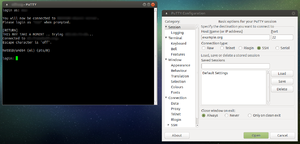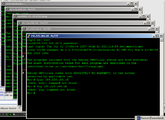WikiDevi.Wi-Cat.RU:Software/PuTTY
|
| |
 PuTTY, running a session on Windows Vista | |
| Developer(s) | Simon Tatham |
|---|---|
| Stable release |
0.63
/ August 6, 2013 |
| Repository | [{{#property:P1324}} {{#property:P1324}}] |
| Written in | C |
| Operating system | Windows and Linux |
| Type | Terminal emulator |
| License | MIT license |
| Website | http://www.chiark.greenend.org.uk/~sgtatham/putty |
PuTTY is a free and open-source terminal emulator, serial console and network file transfer application. It supports several network protocols, including [SCP], SSH, [Telnet] and [rlogin]. The name "PuTTY" has no definitive meaning,[1] though "tty" is the name for a terminal in the [Unix] tradition, usually held to be short for [Teletype].
PuTTY was originally written for [Microsoft Windows], but it has been ported to various other operating systems. Official ports are available for some [Unix-like] platforms, with work-in-progress ports to Classic [Mac OS] and [Mac OS X], and unofficial ports have been contributed to platforms such as [Symbian][2][3] and [Windows Mobile].
PuTTY was written and is maintained primarily by Simon Tatham and is currently beta software.
Features
Some features of PuTTY are:
- The storing of hosts and preferences for later use.
- Control over the [SSH] encryption key and protocol version.
- Command-line [SCP] and [SFTP] clients, called "pscp" and "psftp" respectively.
- Control over port forwarding with SSH (local, remote or dynamic port forwarding), including built-in handling of [X11] forwarding.
- Emulates most [xterm], [VT102] control sequences, as well as much of [ECMA-48] terminal emulation.
- [IPv6] support.
- Supports [3DES], [AES], [Arcfour], [Blowfish], [DES].
- [Public-key] authentication support (no certificate support).
- Support for local serial port connections.
- Self-contained executable requires no installation.
- Supports the zlib@openssh.com delayed compression scheme (As of r9120 2011-03-05).
Version history
PuTTY's development dates back to late 1998,[4] and it has been a usable SSH-2 client since October 2000.[5][6]
Components
PuTTY consists of several components:
- PuTTY: the [Telnet] and [SSH] client itself
- PSCP: an [SCP] client, i.e. command-line secure file copy
- PSFTP: an [SFTP] client, i.e. general file transfer sessions much like [FTP]
- PuTTYtel: a Telnet-only client
- Plink: a command-line interface to the PuTTY back ends
- Pageant: an SSH authentication agent for PuTTY, PSCP and Plink
- PuTTYgen: an [RSA] and [DSA] key generation utility
- pterm: a standalone terminal emulator
Gallery
- PuTTY S60 screenshot.png
PuTTY running on a Symbian [S60] mobile phone, logged into a [Mac OS X] system
See also
- [Comparison of SSH clients]
- [SecureCRT]
- [mintty]
- [WinSCP]
- [Plink]
References
- ↑ "PuTTY FAQ". http://www.chiark.greenend.org.uk/~sgtatham/putty/faq.html#faq-meaning. "[PuTTY is] the name of a popular SSH and Telnet client. Any other meaning is in the eye of the beholder. It's been rumoured that ‘PuTTY’ is the antonym of ‘getty’, or that it's the stuff that makes your Windows useful, or that it's a kind of plutonium Teletype. We couldn't possibly comment on such allegations."
- ↑ PuTTY for Symbian OS
- ↑ Forum Nokia Wiki – PuTTY for Symbian OS
- ↑ Revision 1 in PuTTY SVN
- ↑ PuTTY FAQ: Does PuTTY support SSH-2?
- ↑ PuTTY Change Log



